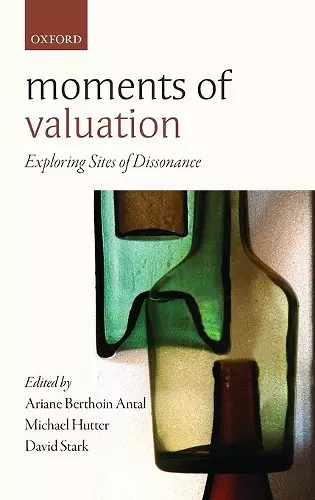Moments of Valuation
Exploring Sites of Dissonance
Michael Hutter editor David Stark editor Ariane Berthoin Antal editor
Format:Hardback
Publisher:Oxford University Press
Published:29th Jan '15
Currently unavailable, and unfortunately no date known when it will be back

The outcome of innovation processes are determined by complex, historically grown valuation practices. In this book, a wide range of innovations are taken into consideration, from small inventions like entertainment novelties to large societal changes through new technologies. The chapters observe the particular local or distributed sites in which their episodes of innovation take place, and they identify the initial dissonance among those judging a newly proposed alternative. The emphasis of the inquiry, however, is on the practices of valuation that are at work when something succeeds in being "new". The authors represent a wide variety of sub-disciplines and national backgrounds in the social sciences. They share an interest in social valuation and a pragmatist approach. The differences between their empirical evidence reflect the wide variety of appearances that valuation takes in contemporary society. They are anthropologists, economic or cultural sociologists, organization researchers, historians or political scientists. A number of chapters deals with aesthetic valuation, as in the tasting of a new vintage, or in the socio-technical process that shaped successful synthesizer sounds. Other chapters discuss the judgment processes in organizations, like architect offices or consultancy firms, and processes of evaluation and valorization in larger fields of practice, like accounting or mathematics. The studies are both of interest in their various professional fields, and contribute to a more general understanding of the social and cultural conditions under which innovations fail and succeed.
Taken together, these chapters provide a broad and multi-level overview of valuations as an analytical lens. Reading through the chapters, I was tempted to reframe many current academic issues as problems of valuation; creativity and innovation, institutional work and contradictory logics, identity and role dynamics, sense making and storytelling approaches could all benefit from thinking in terms of valuation activities and devices. The centrality of materials, aesthetics and practices in performing valuation further suggests a theoretical synergy; indeed, valuation might provide an interesting hook for materiality scholars to hang their hat on. What are the stakes of such a choice, and what would be gained and lost in the process? * Gazi Islam, Grenoble Ecole de Management/U. Grenoble Alpes ComUE-IREGE and Insper, Organization Studies *
A remarkable feature of the book is the persistent coexistence of, on the one hand, the vast array of techniques described to establish aesthetic and material bases for valuation, and on the other hand, the centrality of the principle of dissonance, that newness comes not from the success of these techniques but from their perpetual incompleteness. * Gazi Islam, Organization Studies (SAGE) *
How do we value? There could hardly be more a fundamental social process. The recent, global resurgence of scholarly interest in valuation suggests that there is not. It has captured the attentions of researchers in fields ranging from accounting to science studies. The idea that value is somehow inherent in things has been taken apart, subverted by the contingencies of context, form, and cultures. But the question of innovation, of how new things, places, or expertise are deemed valuable, and how the value of old things is revised or re-appropriated has been relatively neglected. Until now. The editors and authors of Moments of Valuation have accomplished much by demonstrating crucial patterns in that which is provisional in valuation: valuing as situated in time, subjected to translation, testing, demonstration, and genre; sparked by dissonance. John Dewey, I think, would have approved. * Wendy Espeland, Professor of Sociology, Northwestern University *
This collection of brilliant essays suggests that a cacophony of work within cultural sociology can be understood more fully and simply within the frameworks of valuation of dissonance. Not only do these works give scholars important ideas to contend with, they suggest a path for more fruitful conversations about our social world. * Shamus Khan, Associate Professor of Sociology, Columbia University *
Through its focus on moments of valuation, this edited collection radically broadens the range of sites in which the unfolding of value can be observed, from a Chinese art village to Danish pig farms, an AI newsgroup, Berlin restaurants and social housing design. Bringing together key international representatives from sociology, accounting, science and technology studies and organization studies, the book demonstrates that valuation does not necessarily signal the domination of one regime of worth economy, politics, aesthetics over others, but happens at the intersection of different registers. In so doing, Moments of Valuation returns to the all-too-familiar question of the new a much needed sense of puzzlement and surprise. * Noortje Marres, Senior Lecturer in Sociology, Goldsmiths, University of London *
Moments of valuation are certainly critical moments. They determine the fate of whatever it is that is appraised. They also alter the traits of whatever it is that is appraising. The contributions gathered here rightly take these moments as the crucibles in which reality is brewed. These are the sites where an apt vocabulary for the appraisal of valuation shall be developed. * Fabian Muniesa, Ecole des Mines de Paris, author of The Provoked Economy (2014, Routledge) *
Moments of Valuation is an essential contribution to the rich literature on evaluation which is attracting a great deal of interest in North America and Europe alike. The editors have assembled a splendid cast of stars and younger researchers who each shed light on different micro-situation where evaluation unfolds. This important volume shows paths for future inquiries and thus makes a crucial contribution to our understanding of one of the most fundamental social processes. * Michèle Lamont, Harvard University, author of How Professors Think: Inside the Curious World of Academic Judgment *
ISBN: 9780198702504
Dimensions: 240mm x 163mm x 25mm
Weight: 676g
354 pages